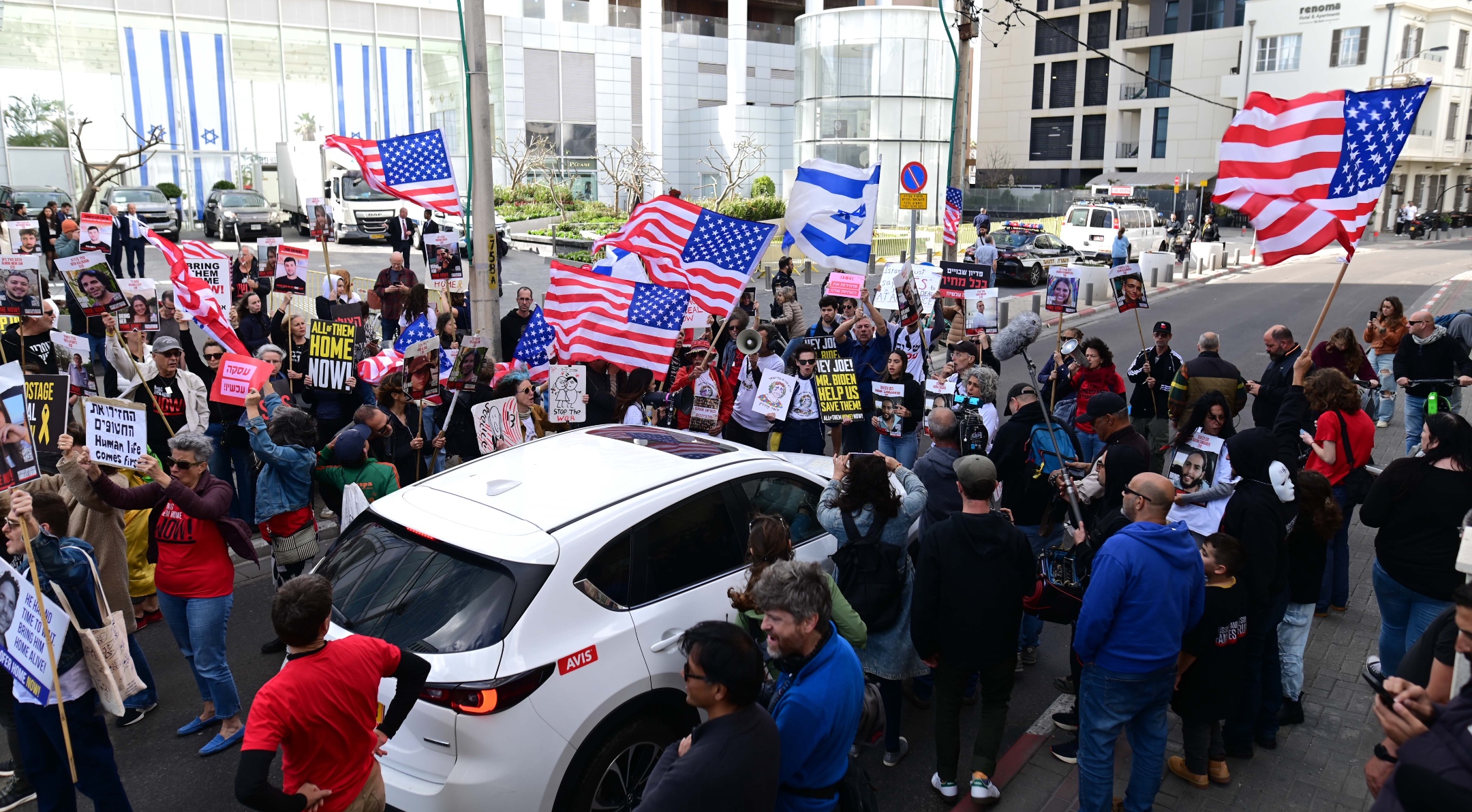Russia and China veto US-led resolution calling for Israel-Gaza ceasefire as part of deal
It was the closest the Biden Administration has come to imposing a pause on the Israel-Hamas war

Israelis protest calling for the release of Israelis held kidnapped by Hamas terrorists in Gaza, outside a meeting of Israeli Prime Minister Benjamin Netanyahu and United States Secretary of State Antony Blinken in Tel Aviv, March 22, 2024. (Tomer Neuberg/Flash90)
(JTA) — A U.S.-led U.N. Security Council resolution calling for a ceasefire in Gaza failed on Friday because Russia and China said it was not strong enough, despite being the closest the Biden Administration has come to calling for a pause in the Israel-Hamas war.
The U.S. delegation accused Russia and China, two of the five countries (along with the United States, France and the United Kingdom) that can veto the council’s resolutions, of not backing the resolution because it referred to the attack by Hamas that launched the war on Oct. 7. It was the first of several resolutions to come before the council to mention Hamas’ attack.
Had it been approved, the resolution would have said that the Security Council “determines the imperative of an immediate and sustained cease-fire.” It framed the ceasefire as essential to a deal that would allow the release of Israeli hostages and the delivery of humanitarian aid to the Palestinians.
It’s not clear if the resolution’s language would have required Israel to cease hostilities. According to media reports, the resolution stopped short of using language which would have made the resolution enforceable under international law, verbs such as “demand” or “call.”
Russia’s envoy to the United Nations said the language made the resolution an “empty rhetorical exercise.”
Linda Thomas-Greenfield, the U.S. ambassador, accused Russian and China of “deeply cynical reasons” for their vetoes, the Associated Press reported, because the resolution referred to the Hamas massacres. The United States has vetoed three ceasefire resolutions so for, in part because they targeted Israel while omitting reference to the Oct. 7 atrocities enacted against it.
The resolution had the backing of 11 nations on the council. Joining Russia and China in voting against was Algeria, currently the Arab representative. Algeria has led past ceasefire resolutions.
The fact that the United States led the backing for any ceasefire resolution was nonetheless evidence of worsening ties between the Biden administration and Prime Minister Benjamin Netanyahu’s government.
Antony Blinken, the secretary of state, is in the Middle East to try to broker a temporary ceasefire that would free hostages still held by Hamas and accelerate the entry of humanitarian assistance into Gaza, which world health officials say is on the verge of famine after more than five months of war.
Blinken, who met Friday with Netanyahu, said the Biden administration continues to oppose the prime minister’s plans to invade Rafah, the city on the Gaza-Egypt border, to flush out the remaining Hamas brigades.
More than 1 million Palestinian civilians in the Gaza Strip have sheltered in Rafah after fleeing from other parts of the strip, often at Israel’s behest. President Joe Biden, who has backed Israel through much of the war, wants detailed plans of an evacuation before Israel enters Rafah.
“A major military operation in Rafah would be a mistake, something we don’t support,” Blinken said after meeting families of the more than 130 hostages remaining in Gaza. Supporters of the families held a rally outside thanking Blinken for his work toward releasing the hostages. Family members of 81 of the hostages released a letter Friday calling for Biden to “use the means available to you” to press Netanyahu to accept “the deal that you assess is reasonable.”
Netanyahu has said he is holding off on entering Rafah while his government prepares plans for the incursion and the evacuation to present to Biden, but on Friday he said after meeting Blinken that he is determined to go in.
“I told him that I greatly appreciate the fact that for more than five months we have been standing together in the war against Hamas,” Netanyahu said in a statement released after his meeting with Blinken.
“I also told him that we recognize the need to evacuate the civilian population from the combat zones and – of course – also see to the humanitarian needs, and we are working to this end,” the statement said. “I also said that we have no way to defeat Hamas without entering Rafah and eliminating the remnant of the battalions there. I told him that I hope we would do this with U.S. support but if necessary – we will do it alone.”
Gilad Erdan, Israel’s ambassador to the United Nations, addressed the security council’s concern about Rafah in a statement, saying, “The road to a permanent ceasefire passes through Rafah! If this council has any other ideas of how to dismantle the terror group without entering Rafah, we would love to hear them.”
This article originally appeared on JTA.org.
A message from our Publisher & CEO Rachel Fishman Feddersen

I hope you appreciated this article. Before you go, I’d like to ask you to please support the Forward’s award-winning, nonprofit journalism so that we can be prepared for whatever news 2025 brings.
At a time when other newsrooms are closing or cutting back, the Forward has removed its paywall and invested additional resources to report on the ground from Israel and around the U.S. on the impact of the war, rising antisemitism and polarized discourse.
Readers like you make it all possible. Support our work by becoming a Forward Member and connect with our journalism and your community.
— Rachel Fishman Feddersen, Publisher and CEO

























